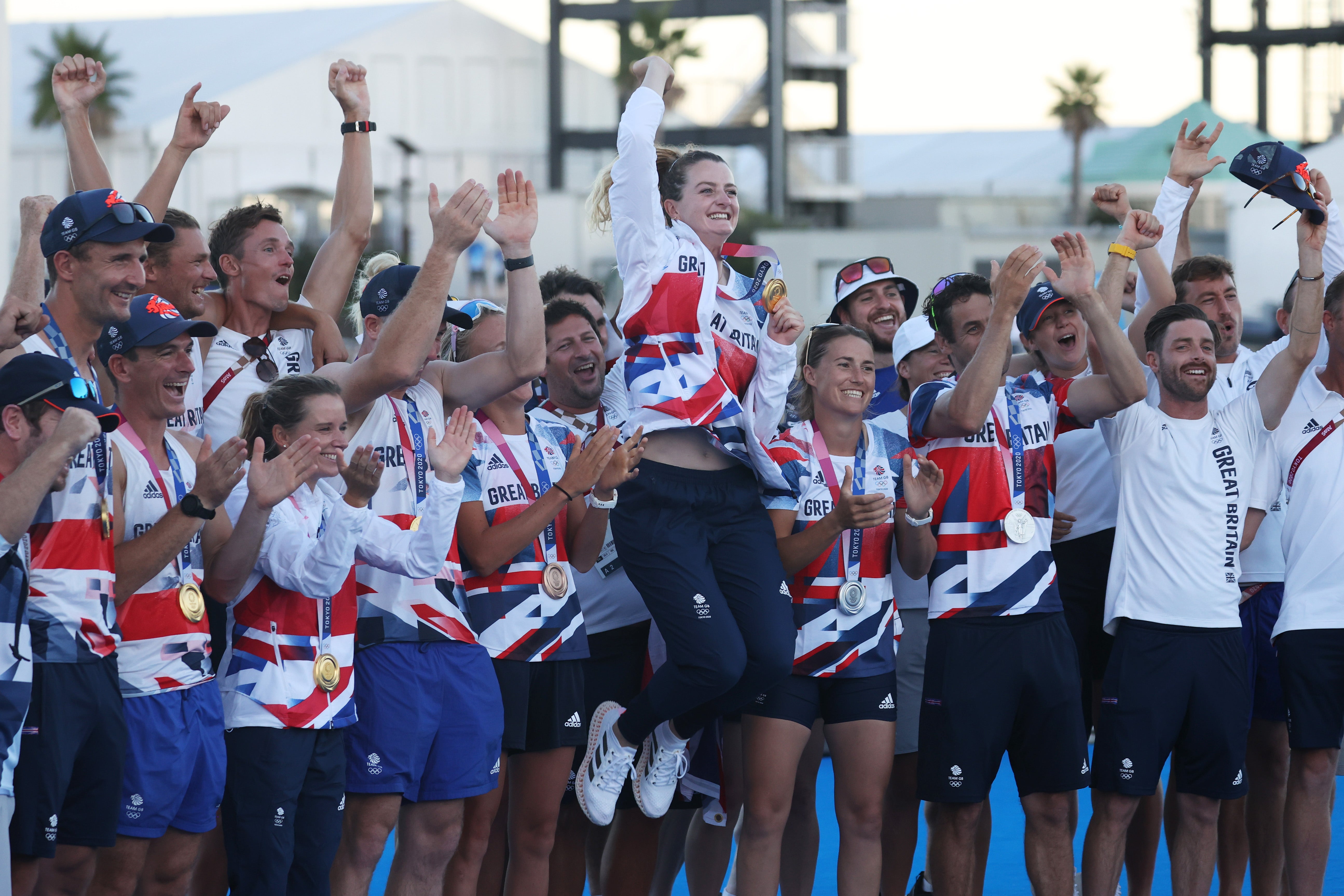The psychology behind Olympic fever: Why do we get so excited about it?
A psychologist explains to Kate Ng why the global sporting competition is unique in its ability to foster a sense of community and inspire people


The Tokyo 2020 Olympics ended on Sunday after weeks of competition, triumph, and defeat, but the celebrations over Team GB’s 65 medals across 23 events are continuing throughout the country.
Despite travel to the games being severely restricted, from the moment that the world’s largest sporting event kicked off two weeks ago, Britain was spellbound. The Discovery channel, the US pay-TV channel that bought the European TV rights to broadcast the games, said last week that a record number of people signed up to its subscription service to watch the Olympic coverage.
Whilst the deal severely limited the BBC’s coverage of the games, viewers still tuned in in droves to watch. For example, according to BARB figures, the men’s 100m final drew 5.1 million TV viewers on the BBC alone.
A survey by the BBC found that the Olympics had an overall positive effect on the UK, with some 80 per cent saying the games made people more proud to be British.
But what is it about watching the world’s best athletes competing against one another and display incredible physical prowess for days on end that makes everyone feel like they’re involved? What stokes the Olympic fever, even in people who aren’t interested in sports any other time?
Dr Josie Perry, of the British Psychological Society’s Division of Sport and Exercise Psychology, explains that the act of watching sports “makes us realise the power of community and triggers the sense of belonging that we all crave”.
This much was evident in other sporting events, for instance, the 2020 UEFA European Football Championship and the 2021 Wimbledon Championships, which drew huge in-person audiences when coronavirus restrictions were eased.
But there is something “special” about the Olympics, said Dr Perry, as it is unique in its ability to “foster a real sense of community in a way few other sports can”.

“I think it has to do with the multi-sport element of the games,” she told The Independent. “There were 33 sports, with hundreds of events, and that means just about everyone can find something they love.
“There might be sports you would switch the channel over from because you’re just not interested, but then there are sports you haven’t seen before or wouldn’t normally see on TV. These are the ones that might make you pause and think, actually, I really like that.”
There were 33 sports, with hundreds of events, and that means just about everyone can find something they love
There are a number of different ways the Olympics makes people feel like they are involved, but one of the most obvious is the use of the name “Team GB”.
“It makes us feel like they are out there representing us, and that we’re part of the team,” said Dr Perry. “On the other hand, there are the underdogs and if we feel like underdogs ourselves, we’re more likely to rally behind the athletes we feel we can relate to.
“One of the other ways we feel involved is if we already do sports ourselves. That’s when you really feel like you’re part of it because you understand how hard what they’re doing is. Sure, they’re going twice the speed you could, but you get it and you can acknowledge how amazing their effort is,” she added.
Dr Perry also noted that there was a shift in conversations around athleticism this year that further humanised the Olympians and made us root for them even more.
“The fact that some of them have spoken about just how hard it is, the anxiety and the stresses involved in training and competing in the games, normalises the fact that they’re not superhuman.
“They are amazing, there’s no doubt, but they also have the same problems as we do. And after 18 months of the pandemic, these similarities are made even more obvious and that makes them relatable.”
Over the last year, Dr Perry said she often turned to the phrase “We’re not all in the same boat, but we’re all in the same storm” to describe the collective experience of the pandemic.
“We’ve all had very different experiences of the pandemic, but we were all in it, and so were the athletes. None of them would have had the lead-up to the Olympics that they expected before 2020.
The fact that some of them have spoken about just how hard it is, the anxiety and the stresses involved in training and competing in the games, normalises the fact that they’re not superhuman
“When we realise that everybody, even the world’s top athletes, has got their own stuff going on behind the scenes, it’s easier to rally behind one another. This year, it did feel that there was more acceptance that Olympians have bad days just like we do, except we get to have them behind closed doors whereas they have them in front of millions of people who are watching their every move.”
The inspiration that the Olympics leaves behind is also part of the reason the public get so into it. Historically, interest in sports spikes right after the games end – for example, after the 2016 Rio Olympics, 200,000 people flocked to the national swimming portal to find a local pool, a rise of almost 40 per cent over the same period the year before.
Dr Perry said that people can act on this new motivation by finding role models closer to home and setting personal goals.

“The trick is to listen to your heart when you pick the goal; the thing you choose to work towards is what turns your tummy with excitement and makes you grin when you think about it; whether a specific time in a race, an event you want to be part of or mastering something tricky like a climbing wall,” she advised.
“Setting a motivating outcome goal like this and breaking down that goal into much smaller controllable process goals will keep us working hard and staying active.”
She added that when the Paralympics kicks off in a couple of weeks, there will be a similar boom in sporting interest and inspiration, as people use it to “be a better version of ourselves”.
“The Paralympians have taken where they were and absolutely excelled and mastered their areas,” she said. “It should inspire us to ask: ‘How can I be brilliant too?’”
Join our commenting forum
Join thought-provoking conversations, follow other Independent readers and see their replies
Comments
Bookmark popover
Removed from bookmarks